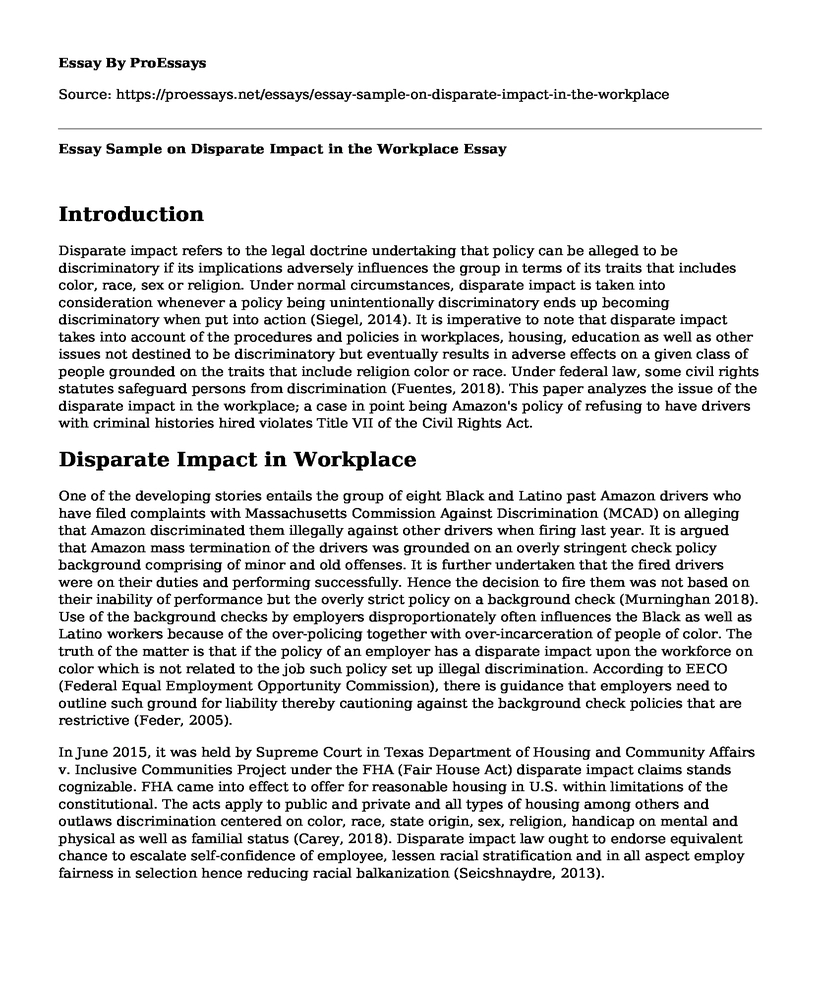Introduction
Disparate impact refers to the legal doctrine undertaking that policy can be alleged to be discriminatory if its implications adversely influences the group in terms of its traits that includes color, race, sex or religion. Under normal circumstances, disparate impact is taken into consideration whenever a policy being unintentionally discriminatory ends up becoming discriminatory when put into action (Siegel, 2014). It is imperative to note that disparate impact takes into account of the procedures and policies in workplaces, housing, education as well as other issues not destined to be discriminatory but eventually results in adverse effects on a given class of people grounded on the traits that include religion color or race. Under federal law, some civil rights statutes safeguard persons from discrimination (Fuentes, 2018). This paper analyzes the issue of the disparate impact in the workplace; a case in point being Amazon's policy of refusing to have drivers with criminal histories hired violates Title VII of the Civil Rights Act.
Disparate Impact in Workplace
One of the developing stories entails the group of eight Black and Latino past Amazon drivers who have filed complaints with Massachusetts Commission Against Discrimination (MCAD) on alleging that Amazon discriminated them illegally against other drivers when firing last year. It is argued that Amazon mass termination of the drivers was grounded on an overly stringent check policy background comprising of minor and old offenses. It is further undertaken that the fired drivers were on their duties and performing successfully. Hence the decision to fire them was not based on their inability of performance but the overly strict policy on a background check (Murninghan 2018). Use of the background checks by employers disproportionately often influences the Black as well as Latino workers because of the over-policing together with over-incarceration of people of color. The truth of the matter is that if the policy of an employer has a disparate impact upon the workforce on color which is not related to the job such policy set up illegal discrimination. According to EECO (Federal Equal Employment Opportunity Commission), there is guidance that employers need to outline such ground for liability thereby cautioning against the background check policies that are restrictive (Feder, 2005).
In June 2015, it was held by Supreme Court in Texas Department of Housing and Community Affairs v. Inclusive Communities Project under the FHA (Fair House Act) disparate impact claims stands cognizable. FHA came into effect to offer for reasonable housing in U.S. within limitations of the constitutional. The acts apply to public and private and all types of housing among others and outlaws discrimination centered on color, race, state origin, sex, religion, handicap on mental and physical as well as familial status (Carey, 2018). Disparate impact law ought to endorse equivalent chance to escalate self-confidence of employee, lessen racial stratification and in all aspect employ fairness in selection hence reducing racial balkanization (Seicshnaydre, 2013).
Conclusion
In conclusion it is apparent that Title VII of 1964 remains to a federal law prohibiting firms from the aspect unfair treatment of workers based on race, gender, religion as well as the national origin. The Act is effective to employers with 15 and above workforces, however, despite its passage discrimination remains a severe problem in today's workplace the same as Amazon's policy tend to violate the Title VII of Civil Rights Act as demonstrated above in this paper.
Reference
Carey, A. (2018). Political Ideology as a Limited Protected Class Under Federal Title VII Antidiscrimination Law. JL & Pol'y, 26, 637.
Feder, J. (2005, September). Federal civil rights statutes: A primer. Congressional Research Service, Library of Congress.
Fuentes, K. (2018). Equality on Trial: Gender and Rights in the Modern American Workplace by Katherine Turk. Labour/Le Travail, 81, 289-291.
Murninghan, M. (2018). Equity Culture and Decent Work: The Case of Amazon (2017). New England Journal of Public Policy, 30(1), 11.
Seicshnaydre, S. E. (2013). Is Disparate Impact Having Any Impact; An Appellate Analysis of Forty Years of Disparate Impact Claims under the Fair Housing Act. Am. UL Rev., 63, 357.
Siegel, R. B. (2014). Race-Conscious but Race-Neutral: The Constitutionality of Disparate Impact in the Roberts Court. Ala. L. Rev., 66, 653.
Cite this page
Essay Sample on Disparate Impact in the Workplace. (2022, Nov 29). Retrieved from https://proessays.net/essays/essay-sample-on-disparate-impact-in-the-workplace
If you are the original author of this essay and no longer wish to have it published on the ProEssays website, please click below to request its removal:
- The Importance of Leadership in Effective Business Management
- Paper Example on Employee Selection and Recruitment
- Essay Sample on Conflict Management Strategy
- Essay Example on Corporate Social Responsibility
- Essay Example on Ensuring Quality Decisions: The Role of DSS
- Non-Profit Employees in Savannah: The Impact of Motivation on Job Satisfaction - Paper Sample
- Strategic Training: Key to Instilling Healthcare Policies and Procedures - Report Sample







